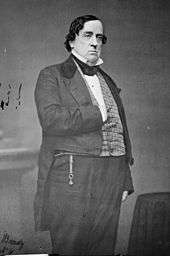Michigander
Michigander and Michiganian are unofficial[1] demonyms for natives and residents of the U.S. state of Michigan. Less common alternatives include Michiganer, Michiganite, Michiganese, and Michigine.[2][3] While governors Jim Blanchard, John Engler, and Jennifer Granholm used Michiganian, more recent governors Rick Snyder[4] and Gretchen Whitmer[5] have used Michigander. A 2011 poll indicated 58% of Michigan residents preferred Michigander, compared to 12% for Michiganian, with 12% having no preference, and 11% not liking either term.[6] In 2017, as part of a unanimous bill to modernize the legislation establishing the Michigan Historical Commission, the state legislature changed a reference from Michiganian to Michigander, implicitly endorsing the latter term.[7] The federal government continues to use Michiganian.[8]
| Look up Michigander in Wiktionary, the free dictionary. |
Residents of the Upper Peninsula typically refer to themselves instead as Yoopers (a formation derived from the initials U.P.) either instead of or in addition to a state demonym.[9] They sometimes refer to residents of the Lower Peninsula who live "below the bridge" between the peninsulas as Trolls, but this term is rarely self-applied.[10]
Origins

Michiganian is the term used for the state's citizens in The Collections of the Michigan Pioneer and Historical Society since the 1870s.
Michigander is considered pejorative by some due to the circumstances under which the term was coined, but others perceive no such negative connotation. The term is attributed to Abraham Lincoln, coining it when he was a Whig representative in Congress. On July 27, 1848, Lincoln made a speech against Lewis Cass, who had been a long-time governor of the Michigan Territory. Cass was then running for president on a "popular sovereignty" platform that would have let states that were conquered in the Mexican–American War decide whether to legalize slavery. Lincoln accused the Democrats of campaigning on the former President Andrew Jackson's coattails by exaggerating their military accomplishments.
But in my hurry I was very near closing on the subject of military tales before I was done with it. There is one entire article of the sort I have not discussed yet; I mean the military tale you Democrats are now engaged in dovetailing onto the great Michigander [i.e. Lewis Cass].[11]
Lincoln thus combined Michigan with gander to form a nickname that made Cass sound foolish like a goose. Despite that, Michigan voters would go on to favor Lincoln for President twice, in 1860 and 1864.
References
- Michigan Historical Center (March 10, 2008). "Michigan FAQ". Michigan Facts & History. Michigan Department of Natural Resources. Archived from the original on December 17, 2009.
- Marckwardt, Albert H. (1952). "Wolverine and Michigander". Michigan Alumnus Quarterly Review. 58: 203–208.
- Sperber, Hans (February 1954). "Words and Phrases in American Politics: Michigander". American Speech. 29 (1): 21–27. doi:10.2307/453592.
- Foley, Aaron (November 3, 2010). "The 'Michigander vs. Michiganian' Debate Crops Up Again in Wake of Snyder's Election". MLive. Booth Newspapers. Retrieved August 27, 2016.
- Office of Governor Gretchen Whitmer (2019). "About the Governor". Office of Governor Gretchen Whitmer. Retrieved June 3, 2019.
- "Poll: 'Michiganders' Embrace the Label". United Press International. February 11, 2011. Retrieved August 27, 2016.
- Gray, Kathleen (November 2, 2017). "Michiganders or Michiganians? Lawmakers Settle It". Detroit Free Press. Retrieved April 4, 2018.
- United States Government Publishing Office (2016). Style Manual: An Official Guide to the Form and Style of Federal Government Publications (PDF) (31st ed.). Washington, DC: United States Government Publishing Office. p. 95. ISBN 9780160936012. OCLC 981985469. Retrieved June 3, 2019.
- "Da 'Yoopers' Added to Merriam-Webster Dictionary Celebrating Residents of Michigan's Upper Peninsula". Daily News. New York. Associated Press. Retrieved June 18, 2017.
- Toeniskoetter, Clare (March 30, 2014). "The Vocabulary of Yoopers, Trolls and Fudgies". Michigan Radio. Retrieved June 18, 2017.
- "Talking About Words". Michigan Today News. University of Michigan News Service. September 15, 2003. Archived from the original on January 3, 2011.